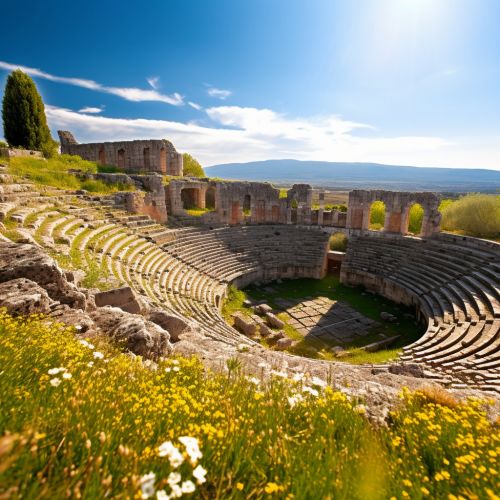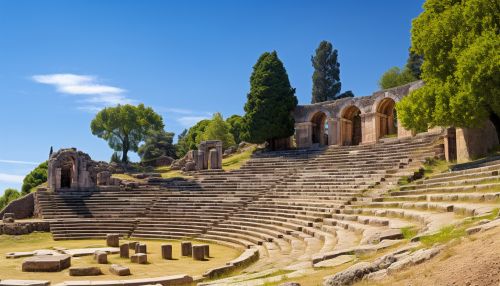Dionysia
Origins and History
The Dionysia was a large festival in ancient Greek culture dedicated to the god Dionysus, the god of wine, pleasure, and festivity. The festival is believed to have been established in the 6th century BCE and was primarily focused on the performance of tragedies, and later comedies. It was one of the most significant celebrations in Athens and was attended by citizens and visitors from all over Greece and beyond.
The Dionysia was held annually for five days in the month of Elaphebolion (late March to early April in the modern calendar). The festival was divided into the City Dionysia (or Great Dionysia) and the Rural Dionysia (or Lesser Dionysia). The City Dionysia was held in Athens, while the Rural Dionysia was held in the rural demes (districts) of Attica.


Structure of the Festival
The Dionysia festival was structured into several days, each with its own significance and activities. The first day was dedicated to the procession (the pompe) in which all participants, including the choruses and actors, paraded through the city to the Theater of Dionysus. The second day was dedicated to the dithyramb, a choral hymn sung in honor of Dionysus. The remaining three days were dedicated to the performance of tragedies and comedies.
Theatrical Competitions
The Dionysia was famous for its theatrical competitions. Three tragic playwrights were selected each year to present their plays, which were judged by a panel of citizens. Each playwright presented a tetralogy, consisting of three tragedies and a satyr play. The winner was awarded a crown of ivy, a symbol of Dionysus.
The Dionysia was also the birthplace of Greek comedy. Initially, the comedic plays were mainly satirical and mocked public figures and institutions. However, over time, the comedies became more sophisticated and tackled a wider range of topics.
Cultural Significance
The Dionysia was not just a festival; it was a significant cultural event that had a profound impact on Greek society. It was a platform for playwrights to present their views on contemporary issues and for the public to engage in political and social discourse. The festival also played a crucial role in the development of Greek drama, which has had a lasting impact on Western literature and theater.
Legacy
The Dionysia festival had a profound influence on the development of drama and theater in the Western world. The structure of the plays, the use of a chorus, the exploration of complex human emotions and moral dilemmas, and the concept of catharsis, all originated from the Dionysia. The festival also inspired the Roman festivals of Bacchanalia and Saturnalia.
